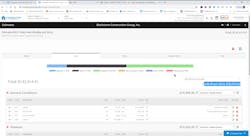Contractor Foreman (www.contractorforeman.com, 503/922-2204, ext. 2) is construction management software with capabilities for both office and field and provides for unlimited projects and unlimited employees.
The software, which integrates with QuickBooks and supports export of data to other programs, addresses estimating, project scheduling, project management, GPS-based timecards, and invoicing and progress billing, has a client portal, and comes with mobile apps for Android and iOS.
The solution also manages estimating, submittals, service tickets, work orders, change orders, subcontracts, bills, punchlists, RFIs and schedule notices, checklists with templates, vehicle and equipment logs, and CSI or NAHB and custom codes in a two-tiered system (over 37 modules in total). In addition, users can generate and maintain incident and OSHA 300 logs from within the solution. There is also the ability to manage and hold safety meetings with 800+ safety topics pre-loaded.
A custom dashboard can show a variety of variables, including clocked in employees and location, appointments and calendar, project snapshots, and access to Live Chat.
The client portal offers clients a direct way to view online estimates, request, review or approve change orders, and pay invoices online. They can also view project photos and the project schedule and interact with your company via online messaging. You decide which items to share.
In creating work orders, you can import data from materials, equipment, labor, and service databases, and can capture the approver’s signature right on the form. You can also track costs on a small project. Both field and office workers can use pre-built PDFs. Each user can select their own language in the App.
Change orders, generated in industry standard form, support inline item editing. You can import data from materials, equipment, labor, service database and can attach it to an estimate. You can also import approved change orders into invoices.
Files and photos can be attached to each record for work order and change order or any other module, as well as automatically stored in a central repository.
Punchlists and to-dos sent direct from the field or office can include annotatable photos. You can email, push or send punchlists as text notifications and use tags, statuses, and priorities to stay up-to-date.
Users can also create checklists for inspections, with the option to attach files, photos, and other supporting data, and can generate one-button reschedules. Service tickets include the ability to dispatch, track customer history and check/in/out times on jobsites, and invoice and log payment directly from the Service Ticket module.
Pricing: per month, paid annually: Standard, Plus, Pro, or Unlimited plan, differentiated by number of users and level of integration with QuickBooks. Free 30-day trial available.
So, how are your crews out in the field doing? One way to find out is through surveys emailed direct to customers upon completion of jobs.
SurveyMonkey Basic plan (free, www.surveymonkey.com) allows a single user to create and send a survey with up to 10 questions of elements (including question types, descriptive text, or images). The user can collect as many responses as they want for free, with view-only access to 40 responses per survey. Under the free plan, extra responses over the response limit are not viewable and each response over the limit will be deleted 60 days after it is received. Various Paid plans give access to all responses and other features on the platform, such as expanded number of surveys and responses, custom colors and survey URL, and the ability to hide the Survey Monkey footer.
Update: Salesforce Field Service (https://www.salesforce.com/products/service-cloud/field-service/) is an enterprise-class platform (part of Salesforce Service Cloud suite of solutions) that handles intelligent scheduling and dispatching, work order management, asset tracking, account details, and safety protocols, with mobile apps available for Android and iOS. (The software was covered under the name Field Service Lightning in Sept. 2019 tech column.)
New features include dynamic priority scheduling and dispatch enabling prioritization based on rules, service level agreements, and traffic. Field Service recommends the best technicians for the job and relies on AI to find the right parts for the job based on previous work. Contractors can store warranties and assign them to products, facilitating creation of standard warranties customizable with extensions, exclusions, and void terms.
Visual Remote Assistant Two-Way Video enables collaboration between onsite and off-site participants in real time to troubleshoot issues (optional at additional cost).
Appointment Assistant allows customers to book their own appointments via self-scheduling and confirm, cancel, or reschedule. The software in real time will find the next best appointment times based on the customer’s preferences and the technician schedule and service resources automatically adjust. Customers, with Appointment Assistant, can be automatically updated on the technician’s arrival time (optional at additional cost).
The mobile app provides field service mobile workers details on the customer, job, and steps needed for the job, along with access to knowledge articles and collaboration tools such as Slack. Field Service mobile workers have the ability to log work hours for time sheets and receive notifications.
Pricing: Field Service licenses for contractors carry a per user per month fee with that purchase requiring at least one Salesforce Service Cloud Enterprise (or above) license and at least one Field Service Dispatcher user license per organization.
Patti Feldman writes articles and web content for trade magazines and manufacturers of building products. She can be reached at [email protected] .
About the Author
Patti Feldman
Patti Feldman writes articles and web content for trade magazines and manufacturers of building products.
